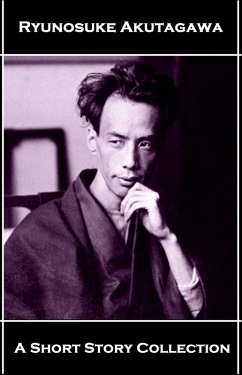Ryunosuke Niihara was born in Irifune, Kyobashi, Tokyo City in Japan on the 1st March 1892. Sadly, his mother suffered severe mental illness after his birth and so, at only eight months old, he was sent to be raised by his maternal uncle and aunt, from whom he received the Akutagawa family name.
Even during his early years he was fascinated by classical Chinese literature and, in 1910, when he arrived at the First High School he became friends with several classmates who would go on to become well regarded authors.
He began writing after entering what was then the Tokyo Imperial University in 1913 to study English Literature.
The following year Akutagawa and his friends revived the literary journal "New Currents of Thought" which published their own works along with translations of such icons as W B Yeats and Anatole France.
Akutagawa published "Rashomon" in 1915 and whilst it was disliked by his friends everyone else knew better. Other stories followed and soon he had a good measure of fame attached to his growing literary reputation.
In 1918 he married Fumi Tsukamoto, and the marriage produced three children.
Much of his work reinterpreted former classical works and incidents and this, melded with his strong dislike of naturalism, produced a writer of rare and genuine quality. His character palette also featured strong, aggressive and domineering women, mainly based on his biological mother and the aunt who helped raise him.
In 1921, he spent four months in China as a reporter for the Osaka Mainichi Shinbun. There his health was compromised by several illnesses and from this point on his physical and mental health spiralled downwards. He began to suffer from hallucinations and dreaded that he might have inherited his mother's mental disorders.
Although he survived one suicide attempt Ryunosuke Akutagawa died on the 24th July 1927 in Tokyo from an overdose of Veronal, a barbiturate. He was 35.
Even during his early years he was fascinated by classical Chinese literature and, in 1910, when he arrived at the First High School he became friends with several classmates who would go on to become well regarded authors.
He began writing after entering what was then the Tokyo Imperial University in 1913 to study English Literature.
The following year Akutagawa and his friends revived the literary journal "New Currents of Thought" which published their own works along with translations of such icons as W B Yeats and Anatole France.
Akutagawa published "Rashomon" in 1915 and whilst it was disliked by his friends everyone else knew better. Other stories followed and soon he had a good measure of fame attached to his growing literary reputation.
In 1918 he married Fumi Tsukamoto, and the marriage produced three children.
Much of his work reinterpreted former classical works and incidents and this, melded with his strong dislike of naturalism, produced a writer of rare and genuine quality. His character palette also featured strong, aggressive and domineering women, mainly based on his biological mother and the aunt who helped raise him.
In 1921, he spent four months in China as a reporter for the Osaka Mainichi Shinbun. There his health was compromised by several illnesses and from this point on his physical and mental health spiralled downwards. He began to suffer from hallucinations and dreaded that he might have inherited his mother's mental disorders.
Although he survived one suicide attempt Ryunosuke Akutagawa died on the 24th July 1927 in Tokyo from an overdose of Veronal, a barbiturate. He was 35.
Dieser Download kann aus rechtlichen Gründen nur mit Rechnungsadresse in D ausgeliefert werden.


